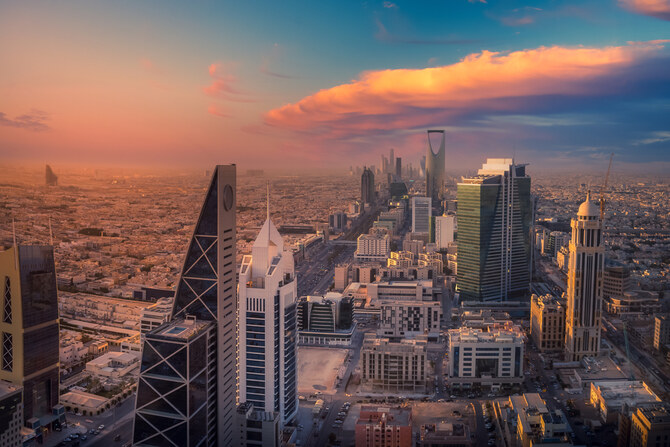RIYADH: Saudi Arabia’s annual inflation rate climbed to 1.5 percent in July compared to the same period last year, driven largely by a surge in housing costs, official data showed.
According to data from the General Authority for Statistics, the 9.3 percent increase in the prices of housing, water, electricity, gas, and other fuels was the primary contributor to the inflation rate.
This category, which represents a significant portion of the consumer price index, played a crucial role in maintaining the overall inflation level.
The authority further noted that food and beverage prices also saw a modest rise of 0.4 percent year on year in July, while transportation costs declined by 3.5 percent during the same period.

This comes against the backdrop of Saudi Arabia’s resilient economy, which maintained an average annual inflation rate of 1.6 percent despite global economic challenges, as noted during a May meeting of the Council of Economic and Development Affairs.
The Kingdom’s inflation rate continues to be one of the lowest in the region, reflecting the government’s proactive efforts to stabilize the economy and mitigate the impact of global price fluctuations.
The GASTAT report further noted that housing costs, particularly actual rents, surged by 11.1 percent year on year in July, driven by a 12 percent increase in apartment rental prices.
“The increase in this (housing) category had a significant impact on maintaining the annual inflation rate for July 2024, given the weight this group represents at 21 percent,” said GASTAT in the report.
Additionally, the cost of dining out and hotel stays rose by 2.3 percent year on year, fueled by a 7 percent increase in accommodation service prices, the authority said.
According to the authority, prices for furnishings and home equipment fell by 3.4 percent in July, with furniture, carpets, and flooring costs decreasing by 5.6 percent.
Clothing and footwear expenses dropped by 3 percent, with ready-made clothing prices declining by 5.5 percent.
Monthly inflation
GASTAT noted a 0.1 percent increase in inflation from June to July. This monthly rise was driven by a 0.1 percent increase in housing, water, electricity, gas, and other fuels, with a 1.2 percent rise in actual housing rents.
Compared to June, prices for restaurants and hotels rose by 0.2 percent, and costs for furnishings, household equipment, and maintenance increased by 0.1 percent in July. Expenses for education and tobacco also went up by 0.2 percent and 0.1 percent, respectively.
Conversely, prices for food and beverages declined by 0.3 percent, and transportation costs fell by 0.4 percent in July.
Recreation and culture prices declined by 0.5 percent, and personal goods and services dropped by 0.3 percent. Clothing and footwear, along with health care products, saw a 0.1 percent month-on-month decrease.
Wholesale Price Index
The Kingdom’s Wholesale Price Index rose to 3.1 percent in July compared to the previous year. This increase was driven by a 15.7 percent rise in basic chemical prices and a 12 percent increase in refined petroleum products. Expenses for other transportable goods edged up by 8.3 percent.
Food products, beverages, tobacco, and textiles saw a 0.9 percent increase, fueled by a 5.0 percent rise in leather, leather products, and footwear prices, and a 4.4 percent increase in grain mills, starch, and other food items.
Conversely, ores and mineral prices decreased by 4.3 percent, while expenses for metal products, machinery, and equipment fell by 0.8 percent.
“Agricultural and fishery products prices experienced a 0.2 percent year-on-year decrease in July, driven by a 0.4 percent decrease in live animals and animal products prices and a 0.1 percent slip in agricultural products prices,” said GASTAT in the report.
On a monthly basis, Saudi Arabia’s WPI decreased by 0.1 percent in July compared to June, largely due to a 0.3 percent drop in prices for agricultural and fishing products.
Metal products, machinery, and equipment saw a 0.3 percent decline, while ores and minerals prices fell by 0.2 percent.
Expenses for other transportable goods remained stable with no significant changes. The WPI tracks the pre-retail prices of 343 items collected monthly from Riyadh, Jeddah, and Dammam.
Average prices
Meanwhile, GASTAT’s latest report revealed notable shifts in the average prices of goods and services in Saudi Arabia for July.
Local melon prices surged by 12.56 percent month on month, while green beans rose by 12.22 percent. Indian pomegranates increased by 7.14 percent, and prices for dates and American cardamom edged up by 5.56 percent and 5.24 percent, respectively.
Local tomatoes and Indian cardamom saw rises of 4.65 percent and 4.47 percent, while imported tomatoes increased by 4.16 percent.
Conversely, prices for local grapes fell by 16.96 percent, with hotel accommodations and furnished apartments dropping by 11.64 percent and 11.34 percent.
Abu Sorra Egyptian oranges declined by 10.75 percent, followed by Pakistani mangoes, Harri sheep, and Lebanese grapes, which fell by 10.27 percent, 9.57 percent, and 8.20 percent, respectively.
These reports highlight the diverse factors affecting inflation and cost of living in the Kingdom.






















